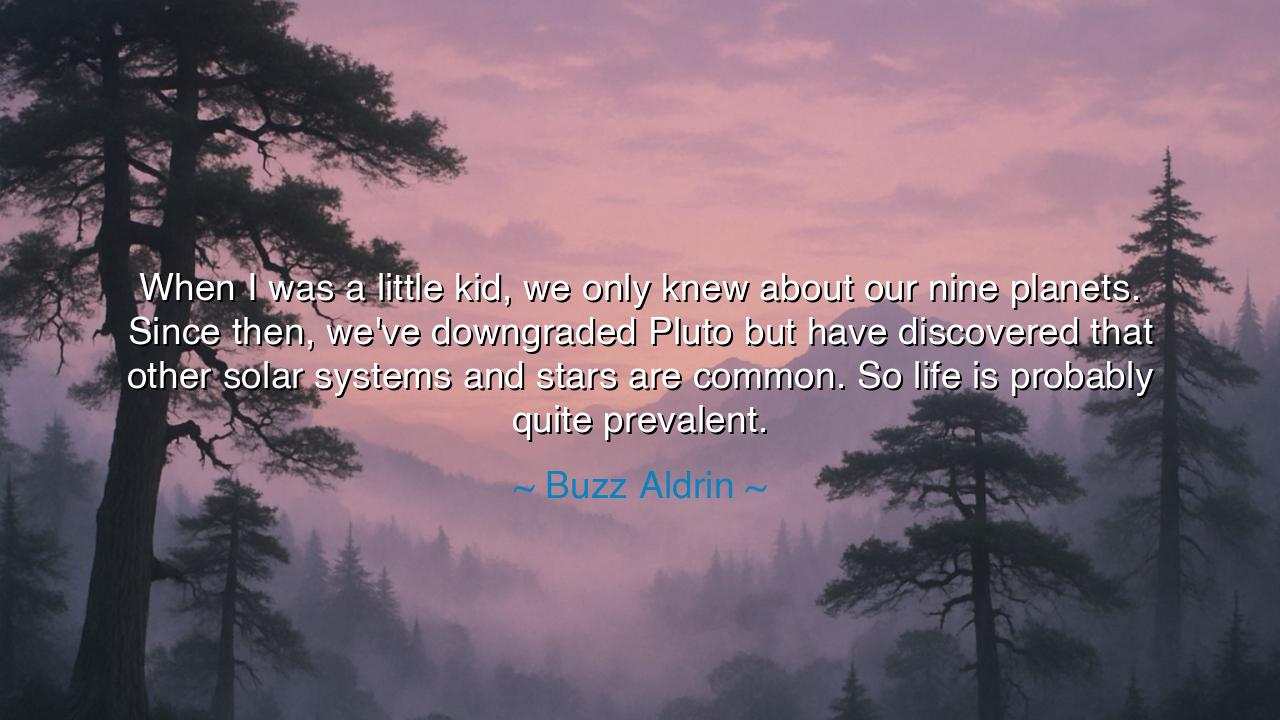
When I was a little kid, we only knew about our nine planets.
When I was a little kid, we only knew about our nine planets. Since then, we've downgraded Pluto but have discovered that other solar systems and stars are common. So life is probably quite prevalent.






"When I was a little kid, we only knew about our nine planets. Since then, we've downgraded Pluto but have discovered that other solar systems and stars are common. So life is probably quite prevalent." – Buzz Aldrin.
In these words, Buzz Aldrin reflects on the profound evolution of human understanding about the universe. As a child, the very idea that our solar system consisted of nine planets was accepted as fact—a simple truth of the cosmos. Yet, in the years that followed, this knowledge has expanded, evolved, and been challenged. The downgrading of Pluto from a planet to a dwarf planet marked the first of many realizations that our view of the cosmos is fluid, shaped by discovery, understanding, and the relentless pursuit of knowledge. Aldrin's words, rich with wisdom, serve as a reminder that the universe is vast, and our place in it is far less defined than we once thought.
The great Greek philosopher Pythagoras, in his time, observed the beauty of the heavens and theorized that the cosmos was governed by mathematical harmony. Yet even his insights, which were revolutionary in their time, could not have fathomed the discoveries we have made today. It is said that Pythagoras believed that the universe was an expression of divine order, a system of perfect proportions and relationships. And while his vision of the universe was limited by the scope of his era, his wonder and reverence for the cosmos opened the door for future thinkers to explore the vastness of the unknown. Today, we stand on the shoulders of such giants, looking beyond the stars and contemplating the existence of life in the infinite expanse of space.
Aldrin’s reflection is not merely about the loss of Pluto’s planetary status, but about the growth of our understanding—the realization that other solar systems, countless stars, and potentially even other forms of life exist beyond the familiar borders of our solar system. The discovery of exoplanets—planets orbiting stars beyond our sun—has revolutionized the way we think about the universe. In ancient times, philosophers such as Aristotle viewed the earth as the center of the universe, with everything revolving around it. To imagine that there are other worlds, perhaps teeming with life, was an idea that belonged to mythology and not science. But now, through the lens of modern astronomy and space exploration, we know that life beyond Earth is not a distant dream but a real possibility.
Consider the discovery of the first exoplanet in 1992, orbiting the pulsar PSR B1257+12. This moment, like the first steps on the Moon, was a defining point in our understanding of the universe. What was once thought to be an isolated world, Earth spinning in the void of space, is now known to be part of a larger and more interconnected universe. And just as Aldrin rightly points out, life may not be a rare phenomenon. It is likely that, in the vastness of space, life—be it in a form we cannot yet comprehend—exists on planets circling other distant stars, in other solar systems, across the milky black sea of the heavens.
In the same way that our ancestors looked to the stars for guidance and inspiration, we too are driven by the same curiosity and yearning for knowledge. It is the essence of our humanity to wonder about our place in the cosmos, to seek answers to the most profound questions: Are we alone? Is life elsewhere as we know it, or is it something radically different? These questions are the same that have echoed in the minds of philosophers, scientists, and dreamers for millennia. And now, with our growing understanding of space, these questions are within our grasp.
The lesson in Aldrin's words is clear: as humanity continues to grow, both in knowledge and in our reach into the stars, we must remain humble and open-minded. Change is inevitable, and as our understanding of the universe expands, so too does our perspective on life itself. Our knowledge of the cosmos is not a final destination but an ongoing journey—an adventure that invites us to keep questioning, discovering, and exploring. We must not hold too tightly to the certainties of the past but rather embrace the endless possibilities that the future holds.
In our own lives, let us take this wisdom to heart. Just as the universe continues to reveal itself to us, so too must we remain open to the unfolding chapters of our own existence. Let us look beyond the familiar, embrace the unknown, and trust that life is full of wonders—both near and far. Let us continue to dream, as Aldrin has, knowing that the pursuit of knowledge and understanding can only bring us closer to the mysteries of the world and beyond. The stars may be distant, but they are not beyond our reach, and neither are the answers we seek. Keep moving forward, looking upward, and embrace the infinite journey that is both ours and the universe's.






AAdministratorAdministrator
Welcome, honored guests. Please leave a comment, we will respond soon